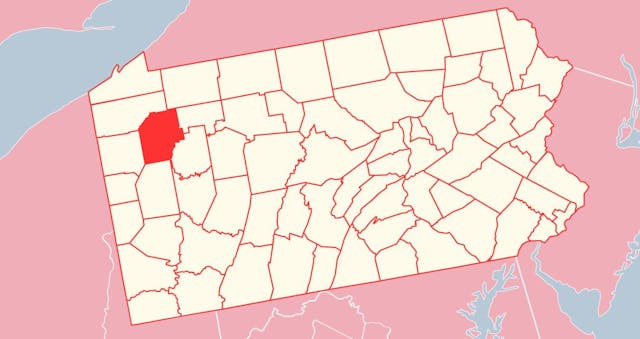Rehabs in Venango
Venango County is a part of the Commonwealth of Pennsylvania. Its administrative center is in Franklin. According to the 2010 US census, the region had a population of 54,948.
The opioid epidemic has dreadful effects on Pennsylvania. It affects both big cities and rural areas. In other words, the rate of heroin misuse in PA is higher than the national average. Moreover, half of the state-funded rehab admissions are because of heroin and prescription opioids.
As of the Behavioral Health Barometer report by SAMHSA, over the last 10 years, 11,6% of all deaths in PA were drug or alcohol involved. There were 2,500 young people (from 12 to 17 years old) among these deaths.
According to the report made by the Institute for Health Metrics and Evaluation (IHME), the rate of mental and substance use disorders mortality from 1998 to 2014 was 11,3 for women and 20,8 for men (per 100,000 population).
So, to overcome issues caused by substance abuse, the state established rehabs in Venango County. It created addiction treatment programs to support those struggling with dependence. Keep reading to get details on the available recovery programs and get professional help as soon as possible.
Available Treatment Programs
Venango County rehabs offer a variety of custom treatments tailored to individual recovery. They are to support those struggling with drug or alcohol dependence. Besides, they help their patients to reach the goal of a healthy and sober life.
These hubs offer 4 main levels of care (detox, outpatient and inpatient plan, and aftercare) and use more than 8 healing methods. The latter covers the individual needs of each patient
One of the popular rehabs in Venango is the center of the Family Service and Children’s Aid Society. It is located at 716 E 2nd Street, Oil City, PA 16301. Call them at 814-677-4005.
As for payment, most of these centers accept insurance. The person may also self-pay or use other means of financial support.
Detox
Detox allows the body to clear all the toxins. However, as detox occurs, levels of substances in the blood drop, often entailing painful withdrawal symptoms. In this stage, the body adapts to the absence of drugs. This process can be very unpleasant and even cause death.
To overcome the discomfort and dangers that this procedure creates, it is always safe to undergo it at a detox center. A patient will have 24/7 access to medical control by expert staff.
Professional guidance will ensure the chances of safe withdrawal and prepare the body for further rehab.
Inpatient Care
Inpatient rehab provides highly structured addiction treatment programs and other services. They are to cover all the facets of dependence and guarantee effective healing.
The main requirement of inpatient rehab is that the patient has to live in a center. The patient benefits from 24/7 therapeutic assistance and medical support.
This plan is for people with severe dependences who also have co-occurring behavioral or mental health disorders.
Outpatient Care
An outpatient plan also includes the same therapies that one can expect from inpatient rehab. However, it will allow its patients to stay at home and even continue with school or work during the healing process.
A person should visit a facility to schedule treatment and recovery sessions during the week. Hence, this plan is effective for those with a mild level of addiction.
Aftercare
Effective substance abuse therapy sometimes requires aftercare services as well. It involves a sustainable recovery plan and ongoing assistance.
The main elements of aftercare are sober living houses, career counseling, and community programs such as Alcoholics (AA) and Narcotics (NA) Anonymous groups and SMART Recovery.
Payment
Many residents of the US need expert care for their substance abuse disorders, however, the cost of rehab keeps some of them from seeking the healing course they need. Luckily, there is a variety of options that provide coverage for drug and alcohol rehabs in Venango County.
The primary forms of financing are private health insurance plans, state-funded programs, grants provided by SAMHSA, Medicaid and Medicare, The Affordable Care Act (ACA), and the US Department of Veterans Affairs.

